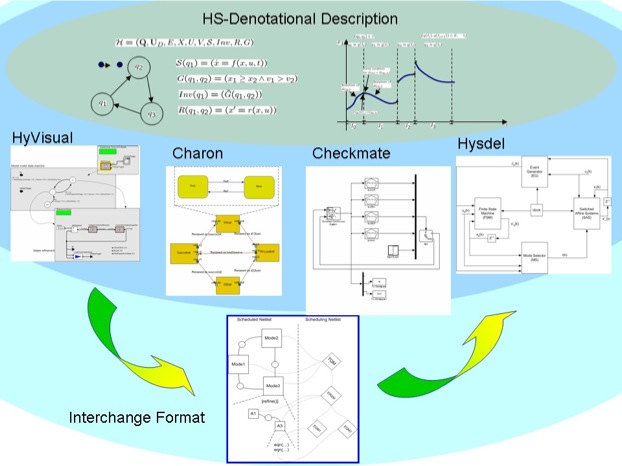

 |  |
|
|

 Interchange formats have been the backbone of the EDA industry for several years. They are used as a way of helping the development of design flows that integrate foreign tools using formats with different syntax and, more importantly, different semantics. The need for integrating tools coming from different communities is even more severe for hybrid systems because of the relative immaturity of the field and the intrinsic difficulty of the mathematical underpinnings. We selected a representative set of tools for the simulation, verification and synthesis of hybrid systems, from industry (Simulink/State Flow and Dymola) and academia (e.g., Charon, CheckMate, d/dt. Hytech, Hysdel, HyVisual, SynDex, Metropolis). We identified the differences between languages as well as their semantic and syntactic features. We proposed an interchange format for hybrid systems with rigorous abstract semantics that can accommodate the translation to and from the formats of the tools we have surveyed while providing a formal reasoning framework. The Interchange Format is general enough so that it can support all the languages overviewed and in this is quite different from others that have been proposed in the past (e.g., HSIF), thus stressing that an Interchange Format is NOT a new design language. The interchange format is based on the Metropolis-Meta-Model language and has been implemented in the Metropolis framework.
The interchange format has been implemented in the Metropolis framework using the Metropolis-Meta-Model language. Each component is characterized by a set of equations and a domain in which the componentÂ’s equations actively contribute to the dynamic evolution of the whole system. Hybrid systems can be composed to form other hybrid systems (i.e. hierarchy) or can be refined into the interconnection of hybrid systems. Components and their interconnections are contained into a view of the model that clearly represents its structure. The order in which the components are executed and the current time stamp is determined by constraints contained in a separate view. We plan to develop translators from some of the reviewed tools and the interchange format to show its effectiveness.


|